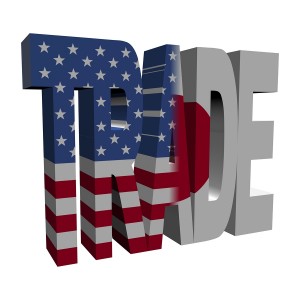The United States and Japan on Friday reached a deal paving the way for Tokyo to join talks on the Trans-Pacific Partnership, a proposed regional free trade agreement that already has been under negotiation for three years.
Here are details of the U.S.-Japan agreement, as outlined by the U.S. Trade Representative’s office.
U.S. AUTO TARIFFS
Japan agreed that U.S. tariffs on imports of Japanese motor vehicles will be phased out in accordance with the longest staging period for any other product in the TPP negotiations, and that phase-outs of these tariffs will be “back loaded” to take place at the end of the staging period.
The two countries also agreed that treatment of these American tariffs will substantially exceed the U.S. tariff treatment provided in the U.S.-Korea Free Trade Agreement.
The United States has a 2.5 percent tariff on passenger cars and 25 percent tariff on light trucks.
The South Korea agreement, which recently had its first anniversary, allows the United States to keep the car tariff until year five and the truck tariff until year eight, after which it will be eliminated over the next two years.
EASIER IMPORT PROCEDURES FOR CARS
Japan will more than double the number of motor vehicles eligible for import under its Preferential Handling Procedure (PHP), a simpler and faster certification method often used by U.S. auto manufacturers to export to Japan.
In the near term, U.S. auto producers will be allowed to export up to 5,000 vehicles annually of each vehicle “type” under the PHP program, compared with the current annual ceiling of 2,000 vehicles per vehicle type.
PARALLEL TALKS ON MANY ISSUES
The United States and Japan will hold a parallel set of negotiations to address a broad range of non-tariff measures in Japan’s automotive sector – including those related to transparency in regulations, standards, certification, “green” and new technology vehicles and distribution – in a bilateral negotiation parallel to the TPP talks.
They also agreed to negotiate a special motor vehicle safeguard provision, as well as a mechanism to “snap back” tariffs as a remedy in dispute settlement cases. The results of the parallel talks will be included as enforceable commitments in the final bilateral market access package agreed between the U.S. and Japan in the TPP negotiations.
The United States will also address concerns about other Japanese non-tariff barriers in parallel negotiations.
Areas targeted for discussion include regulatory transparency, investment restrictions, intellectual property rights protections, standards, government procurement, competition policy, express delivery and food safety rules.
JAPAN POST INSURANCE
The two sides agreed to address U.S. concerns that Japan unfairly restricts access to its domestic insurance market in both the TPP talks and a parallel set of negotiations.
In addition, Japan Post Insurance, a state-owned firm, is expected to refrain for several years from approving new or modified cancer insurance and/or stand-alone medical products.
That is to provide time for Japan to establish equivalent conditions of competition for private sector insurance suppliers and for Japan Post Insurance to put a properly functioning business management system in place.
(Reporting by Doug Palmer; Editing by Will Dunham)





















 Preparing for an AI Native Future
Preparing for an AI Native Future  What Analysts Are Saying About the 2026 P/C Insurance Market
What Analysts Are Saying About the 2026 P/C Insurance Market  Berkshire-owned Utility Urges Oregon Appeals Court to Limit Wildfire Damages
Berkshire-owned Utility Urges Oregon Appeals Court to Limit Wildfire Damages  Earnings Wrap: With AI-First Mindset, ‘Sky Is the Limit’ at The Hartford
Earnings Wrap: With AI-First Mindset, ‘Sky Is the Limit’ at The Hartford 